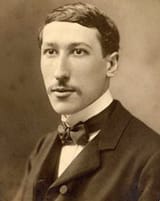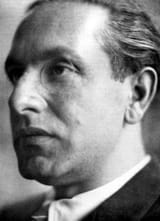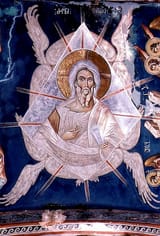Guénon's believed that Orthodoxy > Catholicism
>What we're saying here applies only to the Latin Church, and what's also very remarkable is that, in the Eastern Churches, there has never been any mysticism in the sense in which it has been understood in Western Christianity since the 16th century; this fact may lead us to believe that a certain initiation of the kind to which we alluded must have been maintained in these Churches, and indeed, this is what we find with hesychasm, whose truly initiatory character does not seem in doubt.
Guénon's letter to F. Galvao, 1950
>In case you're not familiar with it, I'd like to refer you to W. Lossky's book, “The Mystical Theology of the Eastern Church”, which I find very interesting and which makes clear certain differences with the Western Christian viewpoint; the word “mystical” itself does not have the same meaning on either side.
Guénon's letter to Jean Tourniac, undated
>There's certainly some truth in what you say about Saint Thomas; you'd be in complete agreement on this point with Monsieur Préau, who even goes so far as to consider Aristotle and Saint Thomas to be the prime movers of modern rationalism, which is perhaps a bit of an exaggeration. As soon as they affirm the existence of the pure intellect, we can't speak of rationalism as far as they're concerned; but in practice, they hardly draw any consequences from this assertion of principle, and their exclusively dialectical method may subsequently have served rationalists well... What is not in doubt is that Catholicism would have had a very different intellectual orientation if the Platonic influence had continued to be exerted as it was before Saint Thomas, instead of being replaced by the Aristotelian influence; this change has had, among other unfortunate consequences, that of neglecting the study of the Fathers of the Church, and especially the Greek Fathers who are certainly the most interesting from a doctrinal point of view. Of course, nothing similar has happened in the Eastern Church, and this is undoubtedly why its theology, right up to the present day, gives the impression of being much more comprehensive and of never having been confined within such narrow limits.
Guénon's letter to F. Galvao, 1950
Guénon's letter to F. Galvao, 1950
>In case you're not familiar with it, I'd like to refer you to W. Lossky's book, “The Mystical Theology of the Eastern Church”, which I find very interesting and which makes clear certain differences with the Western Christian viewpoint; the word “mystical” itself does not have the same meaning on either side.
Guénon's letter to Jean Tourniac, undated
>There's certainly some truth in what you say about Saint Thomas; you'd be in complete agreement on this point with Monsieur Préau, who even goes so far as to consider Aristotle and Saint Thomas to be the prime movers of modern rationalism, which is perhaps a bit of an exaggeration. As soon as they affirm the existence of the pure intellect, we can't speak of rationalism as far as they're concerned; but in practice, they hardly draw any consequences from this assertion of principle, and their exclusively dialectical method may subsequently have served rationalists well... What is not in doubt is that Catholicism would have had a very different intellectual orientation if the Platonic influence had continued to be exerted as it was before Saint Thomas, instead of being replaced by the Aristotelian influence; this change has had, among other unfortunate consequences, that of neglecting the study of the Fathers of the Church, and especially the Greek Fathers who are certainly the most interesting from a doctrinal point of view. Of course, nothing similar has happened in the Eastern Church, and this is undoubtedly why its theology, right up to the present day, gives the impression of being much more comprehensive and of never having been confined within such narrow limits.
Guénon's letter to F. Galvao, 1950


